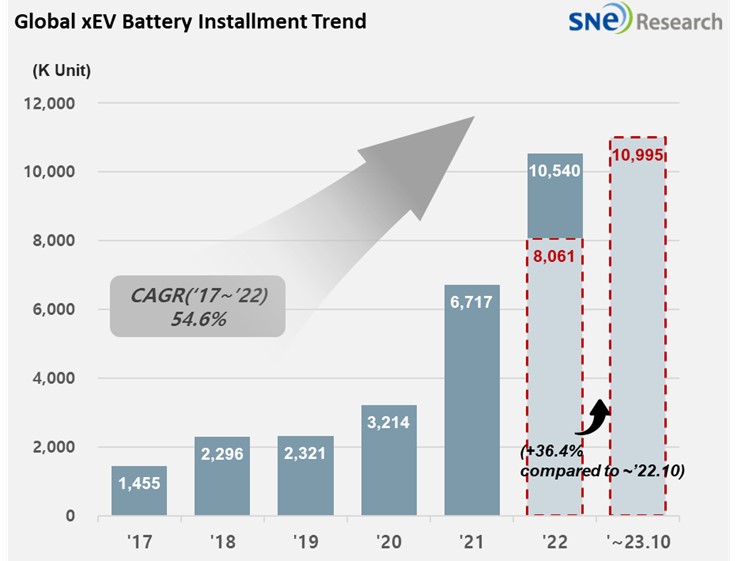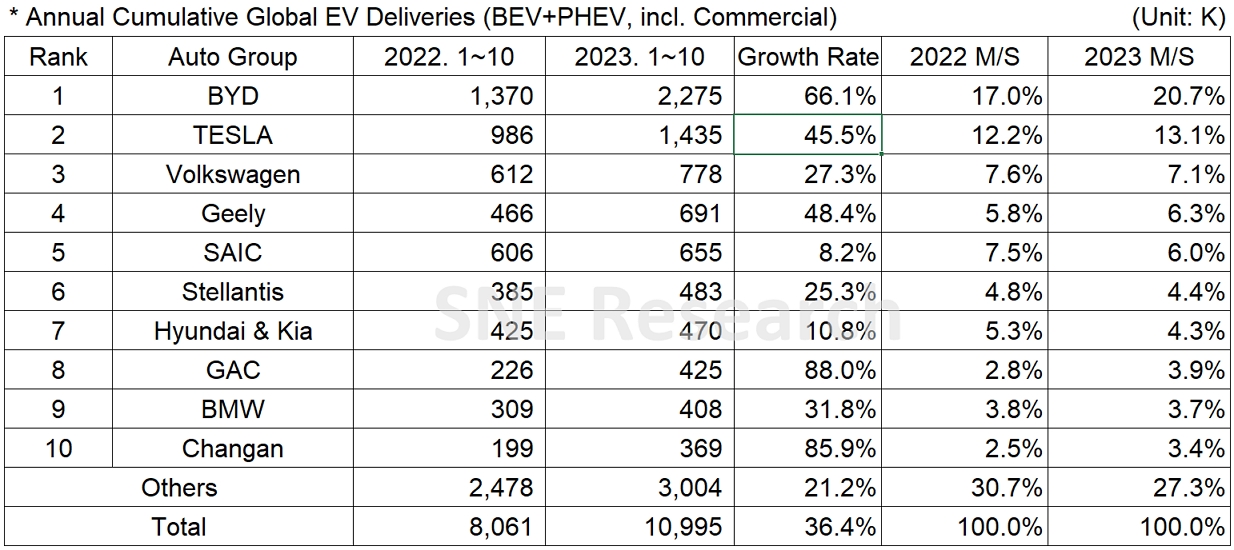From Jan to Oct in 2023, Global[1] Electric Vehicle Deliveries[2] Posted 10.995 Mil Units, a 36.4% YoY growth
- BYD ranked 1st, Tesla 2nd, and Hyundai-KIA 7th in the Global EV Market
From
Jan to September 2023, the total number of electric vehicles registered in
countries around the world was approximately 10.995 units, a 36.4% YoY
increase.

In
the global EV sales by major OEMs from Jan to October in 2023, BYD, a leading
EV company in China posted a 66.1% YoY growth and kept the top position in the
global ranking. BYD accounted for the largest pie based on its variety of
line-up including Song, Yuan Plus (Atto3), Dolphin, and Qin. In addition, BYD
boasted 10 times higher growth compared to last year, exporting almost 80k
units in other regions than China. Tesla, delivering more than 1.43 million
units to customers, recorded a 45.5% YoY growth. Tesla main models – Model 3
and Y – enjoyed favorable sales. With the scheduled launch of Model 3 facelift
Highland and Cybertruck, attentions should be paid to how these new models
would influence the future sales performance of Tesla. The Volkswagen Group,
ranked 3rd on the list, posted a 27.3% growth by delivering approx.
780k units to customers mainly with ID.3/4, Audi Q4, and Q8 E-Tron.

(Source:
Global EV and Battery Monthly Tracker – Nov 2023, SNE Research)
Hyundai-KIA
Group recorded a 10.8% YoY growth by selling more than 470k units of IONIQ 5/6,
EV6, Niro, and Kona. The Group, who broke the record of the highest performance
in Q3 this year, announced that it would focus on expanding its market share by
promoting the global awareness of IONIQ and by increasing the sales of
eco-friendly vehicles through strengthening the line-up of hybrid models.

(Source: Global EV and Battery Monthly
Tracker – Nov 2023, SNE Research)
By
region, China boasted an unequaled position by taking up 85.7% of market share.
China’s current growth momentum is mainly led by BYD who both supplies batteries
to its vehicles and manufactures electric vehicles. BYD, who secured price
competitiveness through vertical integration and focused on new-energy cars, have
sold approx. 2.275 million units in China this year. Given the entire sales of
new-energy cars in China this year being 6.459 million units, it can be said
that among 3 new-energy cars sold in China, one should be made by BYD. In last
July and October, BYD even outperformed Tesla in terms of monthly sales of pure
electric vehicles except PHEV.
On December
1, the US Treasury Department and Energy Department released proposed guidance clarifying
the definition of ‘Foreign Entity of Concern (FEoC).’ To be eligible for the subsidy
program under the IRA, EV makers and battery companies should address new challenges
such as gradually modifying the proportion of FEoC by 2026, manufacturing car
parts, extracting/processing critical minerals, and establishing tracking
systems. While the global EV makers, including Hyundai-KIA, increasingly
adopted LFP battery these days, some analysts suggested that the US IRA and its
specific regulations may act as a great opportunity for the K-trio who have
been accelerating the development and production of LF(M)P.
Amidst
uncertainties such as economic downturns, fluctuations in price of energy and
minerals, and changes in eco-friendly policies and regulations, the EV market
overall has shown a steady growth. As more customers are expected to continue
focusing on cost-effectiveness and price of electric vehicles, it is expected
that customer demand would center around low- and middle-priced electric
vehicles, continuously fueling the growth of EV market.
[2] Based on electric vehicles (BEV+PHEV) delivered to customers or registered during the relevant period.

